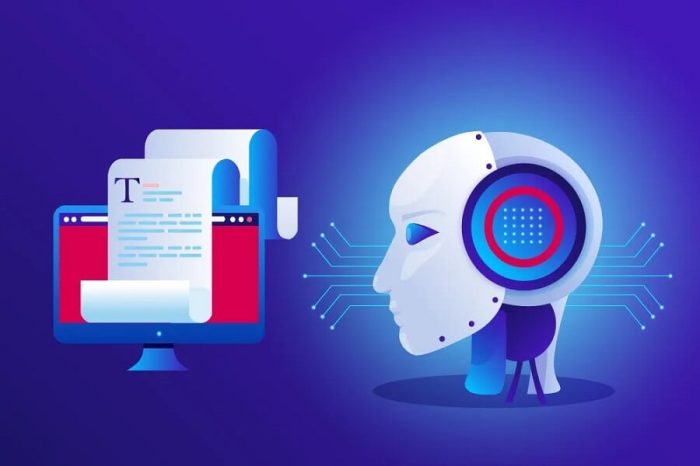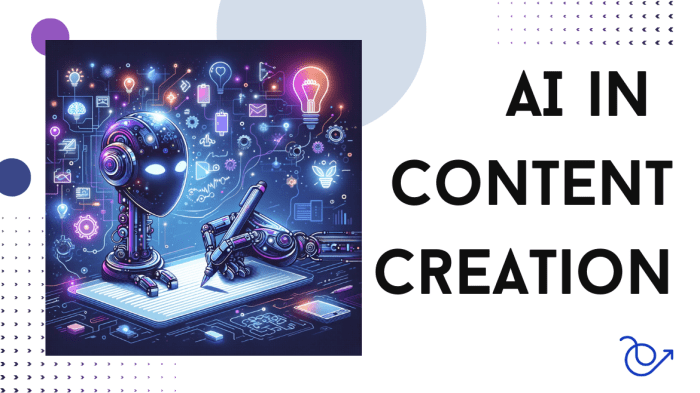Kicking off with Using AI for Content Creation, this cutting-edge approach revolutionizes the content creation game, bringing a new level of innovation and speed to the table. From boosting productivity to streamlining processes, AI is here to stay.
AI has become a game-changer in the realm of content creation, offering a plethora of benefits and possibilities that were once unimaginable. Let’s dive into the world of AI tools and explore the challenges and ethical considerations that come with harnessing this powerful technology.
Benefits of Using AI for Content Creation

Using AI for content creation comes with a plethora of advantages that can revolutionize the way content is produced and consumed. Let’s dive into some of the key benefits below:
Enhanced Efficiency
AI algorithms can analyze data at a much faster rate than humans, allowing for quicker generation of content. This can significantly speed up the content creation process, from research to writing, saving valuable time and resources.
Improved Accuracy
AI tools can help eliminate human errors in content creation by ensuring consistency in writing style, grammar, and tone. This results in more accurate and error-free content, enhancing the overall quality of the output.
Personalized Content
AI can analyze user data and behavior to create personalized content tailored to individual preferences. This level of customization can lead to higher engagement and conversion rates, as the content resonates more with the target audience.
Content Optimization
AI-powered tools can optimize content for search engines, improving visibility and reach. By analyzing s, trends, and user intent, AI can help content creators create more relevant and discoverable content that ranks higher in search results.
Data-driven Insights
AI can provide valuable insights into content performance, audience behavior, and trends. By analyzing data, content creators can make informed decisions on content strategies, topics, and formats, leading to more effective content creation and distribution.
In conclusion, the integration of AI in content creation processes can greatly enhance efficiency, accuracy, personalization, optimization, and insights, ultimately leading to more impactful and successful content campaigns.
AI Tools for Content Creation
When it comes to using AI for content creation, there are several popular tools that have gained recognition in the industry. These tools offer a range of features, usability, and effectiveness, making them valuable assets for content creators.
Popular AI Tools
Here are some of the most popular AI tools used for content creation:
- Grammarly: Known for its grammar and spell-check capabilities, Grammarly helps writers create error-free content.
- Copy.ai: This tool generates content ideas, headlines, and even full articles based on user inputs.
- Wordtune: Wordtune offers suggestions for rephrasing sentences and improving the overall clarity of content.
Comparison of AI Tools, Using AI for Content Creation
Let’s compare these AI tools based on features, usability, and effectiveness:
| AI Tool | Features | Usability | Effectiveness |
|---|---|---|---|
| Grammarly | Grammar and spell-check, tone detection | Easy to use, browser extensions | Highly effective in correcting errors |
| Copy.ai | Content generation, headline creation | Intuitive interface, quick results | Great for generating ideas and saving time |
| Wordtune | Sentence rephrasing, clarity suggestions | Straightforward suggestions, AI-powered | Effective in improving content readability |
Personal Experiences
As a content creator, I have used Grammarly extensively for proofreading and editing my articles. The tool has been instrumental in helping me catch typos and refine my writing style. Additionally, Copy.ai has been a game-changer when I need quick content ideas or catchy headlines for my blog posts. Overall, AI tools have significantly enhanced my content creation process and productivity.
Challenges of Implementing AI in Content Creation
Integrating AI into content creation workflows can come with its own set of challenges that businesses need to address in order to maximize the benefits of this technology.
Data Quality and Quantity
One of the main challenges faced when implementing AI in content creation is ensuring the quality and quantity of data available for training algorithms. AI models require large amounts of high-quality data to function effectively. Businesses need to invest in data collection and cleaning processes to ensure that the AI algorithms have access to the right information.
Lack of Creativity
AI tools may struggle to replicate human creativity and emotional intelligence, leading to content that lacks originality or a personal touch. Businesses need to find a balance between using AI for efficiency and human creativity to ensure that the content resonates with the target audience.
Algorithm Bias
Another challenge is the potential for algorithm bias in content creation. AI models learn from existing data, which may contain biases or prejudices. Businesses need to actively monitor and address bias in AI algorithms to ensure fair and unbiased content creation.
Cost of Implementation
Implementing AI in content creation workflows can be costly, especially for small businesses or startups. The initial investment in AI technology, training, and maintenance may be prohibitive for some organizations. Businesses need to carefully assess the cost-benefit analysis of integrating AI into their content creation processes.
Lack of Human Oversight
While AI can automate many aspects of content creation, it still requires human oversight to ensure quality and accuracy. Businesses need to establish clear processes for human-AI collaboration to leverage the strengths of both in content creation.
Limitations of AI in Creativity
AI technology, while powerful, still has limitations when it comes to creativity and understanding complex human emotions. Businesses should be aware of these limitations and use AI as a tool to enhance, rather than replace, human creativity in content creation.
Ethical Considerations in AI Content Creation

When it comes to utilizing AI for content creation, there are several ethical considerations that need to be taken into account. These considerations revolve around issues such as bias, privacy, and authenticity in AI-generated content.
Bias in AI Content
One of the primary ethical concerns with using AI for content creation is the presence of bias in the generated content. AI algorithms are trained on existing data, which can often contain biases present in society. This can lead to the perpetuation of stereotypes or discrimination in the content produced.
Privacy Concerns
Another important ethical consideration is the privacy of individuals whose data may be used to train AI models. Content created using AI may involve personal information, and it is crucial to ensure that this data is handled and used responsibly to protect the privacy rights of individuals.
Authenticity of AI-Generated Content
Ensuring the authenticity of AI-generated content is also a key ethical concern. It is essential to be transparent about the use of AI in content creation and to clearly distinguish between content created by humans and content generated by AI. This transparency helps maintain trust with audiences and prevents deception.
Strategies for Ethical AI Content Creation
- Implementing diverse training data to reduce bias in AI-generated content.
- Regularly auditing AI algorithms to identify and mitigate biases.
- Obtaining informed consent from individuals whose data is used for training AI models.
- Providing clear disclosure when AI is used in content creation.
- Establishing guidelines and standards for ethical AI content creation within organizations.
